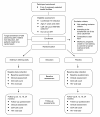Effect of selenium supplementation on CD4 T-cell recovery, viral suppression, morbidity and quality of life of HIV-infected patients in Rwanda: study protocol for a randomized controlled trial
- PMID: 21838913
- PMCID: PMC3182905
- DOI: 10.1186/1745-6215-12-192
Effect of selenium supplementation on CD4 T-cell recovery, viral suppression, morbidity and quality of life of HIV-infected patients in Rwanda: study protocol for a randomized controlled trial
Abstract
Background: Low levels of serum selenium are associated with increased risk of mortality among HIV+ patients in East Africa. We aim to assess the effect of selenium supplementation on CD4 cell count, HIV viral load, opportunistic infections, and quality of life in HIV-infected patients in Rwanda.
Methods and design: A 24-month, multi-centre, patient and provider-blinded, randomized, placebo-controlled clinical trial involving 300 pre-antiretroviral therapy (ART) HIV-infected patients will be carried out at two sites in Rwanda. Patients ≥ 21 years of age with documented HIV infection, CD4 cell count of 400-650 cells/mm3, and not yet on ART will be recruited. Patients will be randomized at each study site using a randomized block design to receive either the selenium micronutrient supplement or an identically appearing placebo taken once daily. The primary outcome is a composite of time from baseline to reduction of CD4 T lymphocyte count below 350 cells/mm3 (confirmed by two measures at least one week apart), or start of ART, or the emergence of a documented CDC-defined AIDS-defining illness. An intention-to-treat analysis will be conducted using stepwise regression and structural equation modeling.
Discussion: Micronutrient interventions that aim to improve CD4 cell count, decrease opportunistic infections, decrease HIV viral load, and ultimately delay initiation of more costly ART may be beneficial, particularly in resource-constrained settings, such as sub-Saharan Africa. Additional trials are needed to determine if micro-supplementation can delay the need for more costly ART among HIV-infected patients. If shown to be effective, selenium supplementation may be of public health importance to HIV-infected populations, particularly in sub-Saharan Africa and other resource-constrained settings.
Trial registration: ClinicalTrials.gov NCT01327755.
Figures
References
-
- Piwoz EG, Preble EA. A review of the literature and recommendations for nutritional care and support in sub-Saharan Africa. Support for Analysis and Research in Africa, SARA/USAID. 2000.
-
- Gross RL, Newberne PM. Role of nutrition in immunologic function. Physiol Rev. 1980;60:188–302. - PubMed
-
- Bendich A. Micronutrients and immune responses. Ann N Y Acad Sci. 1990;587:168–180. - PubMed
-
- Beisel WR. Single nutrients and immunity. Am J Clin Nutr. 1982;35(suppl):417–468. - PubMed
Publication types
MeSH terms
Substances
Associated data
LinkOut - more resources
Full Text Sources
Medical
Research Materials


